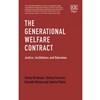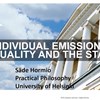stat
The Matthew effect in political science: head start and key reforms important for democratization
Are some countries better equipped from the onset of a democratization process to become democracies? We compared successful and failed episodes of liberalization over the period 1900 to 2018 to exami

The more things change, the more they stay the same. A follow up of participants in Social Fund financed projects
Research report 2014/5, 77 p. Every year in Sweden, over one hundred thousand job-seekers are assigned to local labour market policy measures, of which a large proportion are financed with money from t
Trust, social movements, and the state
Journal of Trust Research Abstract A large literature has developed around the concept of political trust, but what exactly political trust is remains ambiguous. Some studies present it as a narrower ev

A welfare state for all generations
In a society there are always several generations co-existing and they all need different things from the welfare state. This result is a conflict between generations on who should be favored by publi by , Tommy Ferrarini, Kenneth Nelson and Joakim Palme.
Peter Hedström leaves the Institute for Futures Studies to start new research center for analytical sociology
Peter Hedström, Director of the Institute for Futures Studies, will leave the Institute in August 2014. Peter will then be Professor of Sociology at Linköping University, where he will build a new rese
Applying spatial regression to evaluate risk factors for microbiological contamination of urban groundwater sources in Juba, South Sudan
Hydrogeology Journal 25(4) pp. 1077-1091, doi: 10.1007/s10040-016-1504-x Abstract This study developed methodology for statistically assessing groundwater contamination mechanisms. It focused on microbiahumanitarian aid organisation Médecins Sans Frontières in 2010. The factors included hydrogeological settings, land use and socio-economic characteristics. The results showed that the residuals of a conventional probit regression model had a significant positive spatial autocorrelation (Moran’s I =3.05, I-stat = 9.28); therefore, a spatial model was developed that had better goodness-of-fit to the observations. The mostsignificant factor in this model (p-value 0.005) was the distance from a water source to the nearest Tukul area, an area with informal settlements that lack sanitation services. It is thus recommended that future remediation and monitoring efforts in the city be concentrated in such low-income regions. The spatial model differed from the conventional approach: in contrast with the latter case, lowland topography was not significant at the 5% level, as the p-value was 0.074 in the spatial model and 0.040 in the traditional model. This study showed that statistical risk-factor assessments of groundwater contamination need to consider spatial interactions when the water sources are located close to each other. Future studies might further investigate the cut-off distance that reflects spatial autocorrelation. Particularly, these results advise research on urban groundwater quality.

Säde Hormio: Individual emissions, equality and the state
Seminar with Säde Hormio, researcher in Practical Philosophy at the University of Helsinki. ABSTRACT The amount of greenhouse gases that can still be emitted to the atmosphere is very limited if global
Completed: Policy professionals in the welfare state
This project examines so called "policy professionals", people who are employed in order to affect policy and politics. What is the impact of them, rather than elected officials, gaining more influence over politics?
Säde Hormio: Individual emissions, equality and the state
Seminar with Säde Hormio, researcher in Practical Philosophy and Marie Skłodowska-Curie Fellow at the University of Helsinki. REGISTER Abstract The amount of greenhouse gases that can still be emitted to
CANCELLED! Cécile Laborde: Is the Liberal State Secular?
Cécile Laborde, Professor of Political Theory FBA, Nuffield Chair of Political Theory.ABSTRACTIn this talk, I ask whether liberal legitimacy requires secularism – or separation between state and relig








